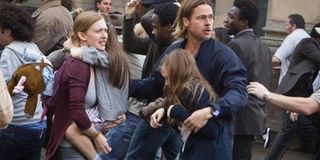World War Z's Behind-The-Scenes Breakdown Is A Must-Read

If you follow the movie industry closely, there's nothing more fascinating than an autopsy of a disaster, when the people behind a film get away from the promotional speak and soundbites and really dig into what made a film fall apart. It's rare to get that level of candor at any point, but it's practically impossible to get it before a film opens. Which is what makes Vanity Fair's cover story on World War Z an absolute, stop-everything must-read.
Brad Pitt doesn't chime in on the various setbacks and disasters on the film, and the conversations with Marc Forster aren't especially enlightening-- talking about a film that endured expensive reshoots and a complete rewrite of the third act, Forster says "For me, it’s like, I had a good time on this film. I didn’t feel like it was a big drama." But conversations with many other people on the project, including Pitt's Plan B producing partner Dede Gardner and Damon Lindelof, who was brought in to rewrite the film's ending, reveal a film that ran into all kinds of problems that might tank a smaller film. Millions of dollars of debts from the film's first shooting location, in Malta, went unpaid because someone lost the forms in a drawer. They shot an entire battle scene set in Russia even when everyone on the film now admits (with 20/20 hindsight) that they knew it didn't work for the script. And while Forster denies pervasive rumors that he and Pitt stopped speaking to each other on set, he admitted his falling-out with the film's on-set visual effects supervisor: “John Nelson and I, it was a chemistry thing." Nelson, who won an Oscar for Gladiator, was replaced during post-production.
Of course, these are all just standalone facts, and you've really got to read the whole thing for a story that sounds a whole lot more interesting than the version of World War Z that we'll see onscreen on June 21. From the moment Forster made the decision to adapt Max Brooks's heady novel as an action-packed adventure, the whole thing seemed to snowball into a mass of bad decisions. But did Lindelof and co-writer Drew Goddard manage to right the ship? More importantly, do you feel remotely inspired to pay for a ticket to this and find out for yourself?
CINEMABLEND NEWSLETTER
Your Daily Blend of Entertainment News
Staff Writer at CinemaBlend
Most Popular









